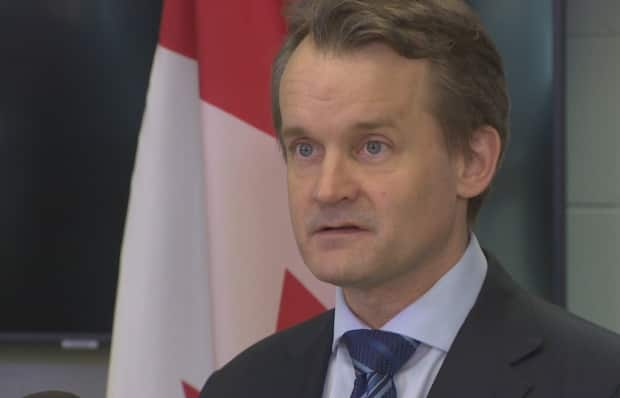Exploratory drilling now exempt from federal environmental impact assessment

The federal government has announced a change it expects will help Newfoundland and Labrador's oil and gas industry as it struggles to stay on its feet.
A new regulation means environmental assessments for exploratory drilling offshore will be done more quickly, by exempting offshore drilling in Newfoundland and Labrador from federal environmental impact assessments.
The move — which Natural Resources Minister Seamus O'Regan announced in St. John's Thursday — is expected to reduce the time that such assessments will take to as little as 90 days.
When I spoke with oil industry CEOs, that regulatory hurdle was still their No. 1 impediment to exploring off Newfoundland. - Seamus O'Regan
Ministerial exemption regulations came into effect Thursday through the Impact Assessment of Canada.
The change "excludes exploratory drilling processes within our region from the requirement to undergo a project specific federal impact assessment," said O'Regan, who is also Newfoundland and Labrador's federal cabinet representative.
"From business and investors in this industry, this has been the No. 1 thing that the government of Canada has been asked for for years."

O'Regan said it will reduce the time assessment take to a tenth of the time they used to require.
"Here's what the regional assessment does: It provides faster timelines for exploration on the offshore of this province, from up to 905 days under the previous legislation to as little as 90 days," O'Regan said.
The announcement comes as Newfoundland and Labrador's offshore oil industry has been reeling from one setback after another. Hundreds of layoffs at the Hibernia platform are looming, while production remains dormant at the Terra Nova field.
Meanwhile, the Bay du Nord oil prospect — which was touted as opening up a new deepwater frontier for petroleum development off Newfoundland — has been put on hold, and exploratory work by the Chinese company CNOOC International has been suspended.
Integrity of assessments
O'Regan focused on the value of faster assessments, and was emphatic that they will still be thorough.
"When we talk about tightening these timelines we are in no way taking away from the integrity of the environmental standards that we have," he told reporters.
It was government at its worst, to be honest with you. It just wasn't designed for our offshore. - Seamus O'Regan
He said the old process was inefficient and required the same paperwork repeatedly.
"It was government at its worst, to be honest with you. It just wasn't designed for our offshore," said O'Regan.
"When I spoke with oil industry CEOs, that regulatory hurdle was still their No. 1 impediment to exploring off Newfoundland. It was just all the time that it took."
Assessments will continue to be done locally.
A federal statement Thursday said the regulations will still require proponents to consult with the Canada-Newfoundland and Labrador Offshore Petroleum Board, which regulates the offshore industry, as well as with federal authorities such as Fisheries and Oceans Canada.
Response to pleas for federal help
The minister was also asked to respond to a letter that the Newfoundland Offshore Industries Association, known as Noia, recently wrote to the federal government. Local industry leaders and politicians are looking for assistance as the industry struggles with low oil prices and slumping demand amid the COVID-19 pandemic.
"What we're trying to arrive at is a solution that will in the short term will help people now. What can we do right now to make sure that people are okay so that when we get through this those companies and that industry remains intact. Those talks are ongoing all the time," said O'Regan.
O'Regan believes what is happening in the oil industry can be described as a slump but he expects the industry in Newfoundland and Labrador will rebound, especially if it is committed to reducing emissions.
"There will be a place for oil for quite a long time. We haven't found another way to fly a plane yet. There are still decades of oil use," he said.
"We have a product that is very competitive. It's a sweet, light crude on our offshore. We have a stable regulatory environment. These things you don't take for granted when people are looking for investments around the world."
Read more from CBC Newfoundland and Labrador

